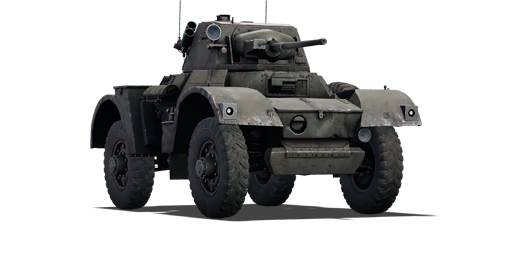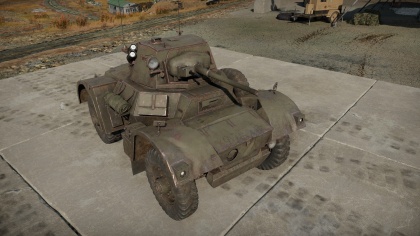Difference between revisions of "Daimler Mk II"
m (Update mobility characteristics (speed values for AB and RB/SB)) (Tag: Visual edit) |
(→History) (Tag: Visual edit) |
||
| Line 227: | Line 227: | ||
== History == | == History == | ||
| − | <!--''Describe the history of the creation and combat usage of the ground vehicle in more detail than in the introduction. If the historical reference turns out to be too big, take it to a separate article, taking a link to an article about the vehicle and adding a block "/historical reference" (example: https://wiki.warthunder.com/Name-vehicles/historical reference) and add a link to it here using the <code>main</code> template. Be sure to include links to sources at the end of the article.''--> | + | The excellent performance of the turretless Daimler Scout Car led people to suggest that a larger armoured car version with a turret be built as well. The Daimler AC was similar in design, but also introduced a rear-facing wheel for the commander to use in an emergency. It carried the same turret as the Tetrarch light tank, putting it on a par with early-war British tanks. German bombing raids over England hampered production, however, and the vehicle did not enter combat until mid-1942. 2,694 would be built built. In the Desert Campaign, they were used by the King's Dragoon Guards and the Royal Dragoons, and by the time of the Tunisia campaign, additional armoured car regiments. In the desert, the Daimler was normally the heaviest-armed armoured car, with one in each three-car troop. After the North Africa campaign, armoured car troops were reorganized into 4-car troops with 2 Daimlers and 2 lighter armoured scout cars. Daimlers were also used by the 11th Cavalry in the Burma campaign. They remained in British service until 1960. <!--''Describe the history of the creation and combat usage of the ground vehicle in more detail than in the introduction. If the historical reference turns out to be too big, take it to a separate article, taking a link to an article about the vehicle and adding a block "/historical reference" (example: https://wiki.warthunder.com/Name-vehicles/historical reference) and add a link to it here using the <code>main</code> template. Be sure to include links to sources at the end of the article.''--> |
== Media == | == Media == | ||
Revision as of 01:10, 31 August 2019
Contents
Description
The Daimler Armoured Car Mk.II is a Rank I British light tank with a battle rating of 1.3. It was introduced in Update 1.71 "New E.R.A.". Boasting the usual British Rank 1 QF 2-pounder on a wheeled platform. It is the first vehicule in the AC/AA line of the British tech tree.
A QF 2-pounder on 4x4 wheels. This vehicle is made to support infantry in a way similar to cavalry. It is not made to withstand heavy fire. Notably, its wheeled configuration means the car will not get good fire when on the move and it will turn in an arc. Meanwhile, its good reverse speed could possibly save the car as long as the move happens before the enemy shoots. The Daimler is recognisable from other AC by its hexagonal hull center and it's short length. It has 4 mm boxes scattered across the hull and a spare tire on the left side. Besides the main armament, it is equipped with a coaxial BESA MG (same MG as higher rank British vehicles), a decent gun to spread onto an open-topped SPG with lead, ending him rightly.
General info
Survivability and armour
Armour type:
- Rolled homogeneous armour
- Cast homogeneous armour (Gun mantlet)
| Armour | Front (Slope angle) | Sides | Rear | Roof |
|---|---|---|---|---|
| Hull | 14 mm (1°) Front plate 14 + 4 mm Front glacis 14 mm (34°) Lower glacis 16 mm (1°) Driver's port |
10 mm (19-34°) Top 10 mm Bottom |
14 mm (1°) Top 14 mm (18-24°) Bottom |
8 mm |
| Turret | 16 mm (16°) Turret front 16 mm (0-79°) Gun mantlet |
14 mm (16-17°) | 10 + 4 mm | 4 mm |
Notes:
- Belly armour is 7 mm thick.
- Wheels provide 2 mm thick armour.
- A 14 mm RHA plate separates the engine compartment from the crew.
Mobility
| Mobility characteristic | ||
|---|---|---|
| Weight (tons) | Add-on Armor weight (tons) |
Max speed (km/h) |
| 7.6 | N/A | 77 (AB) |
| 70 (RB/SB) | ||
| Engine power (horsepower) | ||
| Mode | Stock | Upgraded |
| Arcade | 112 | ___ |
| Realistic/Simulator | 84 | 95 |
| Power-to-weight ratio (hp/ton) | ||
| Mode | Stock | Upgraded |
| Arcade | 14.74 | __.__ |
| Realistic/Simulator | 11.05 | 12.50 |
Armaments
Main armament
| 40 mm OQF 2-pounder | |||||
|---|---|---|---|---|---|
| Capacity | Vertical guidance |
Horizontal guidance |
Stabilizer | ||
| 52 | -12°/+25° | ±180° | Vertical | ||
| Turret rotation speed (°/s) | |||||
| Mode | Stock | Upgraded | Prior + Full crew | Prior + Expert qualif. | Prior + Ace qualif. |
| Arcade | 9.50 | _.__ | _.__ | _.__ | _.__ |
| Realistic | 9.50 | _.__ | _.__ | _.__ | _.__ |
| Reloading rate (seconds) | |||||
| Stock | Prior + Full crew | Prior + Expert qualif. | Prior + Ace qualif. | ||
| 3.60 | _.__ | _.__ | _.__ | ||
Ammunition
| Penetration statistics | |||||||
|---|---|---|---|---|---|---|---|
| Ammunition | Type of warhead |
Penetration in mm @ 90° | |||||
| 10m | 100m | 500m | 1000m | 1500m | 2000m | ||
| Shot Mk.1 AP/T | AP | 80 | 79 | 61 | 46 | 32 | 21 |
| Shot Mk.1 APCBC/T | APCBC | 74 | 72 | 64 | 58 | 48 | 43 |
| Shell details | ||||||||||
|---|---|---|---|---|---|---|---|---|---|---|
| Ammunition | Type of warhead |
Velocity in m/s |
Projectile Mass in kg |
Fuse delay
in m: |
Fuse sensitivity
in mm: |
Explosive Mass in g (TNT equivalent): |
Normalization At 30° from horizontal: |
Ricochet: | ||
| 0% | 50% | 100% | ||||||||
| Shot Mk.1 AP/T | AP | 853 | 1.1 | N/A | N/A | N/A | -1° | 47° | 60° | 65° |
| Shot Mk.1 APCBC/T | APCBC | 853 | 1.2 | N/A | N/A | N/A | +4° | 48° | 63° | 71° |
Ammo racks
| Full ammo |
1st rack empty |
2nd rack empty |
3rd rack empty |
4th rack empty |
Visual discrepancy |
|---|---|---|---|---|---|
| 52 | 40 (+12) | 27 (+25) | 14 (+38) | 1 (+51) | No |
Machine guns
| 7.92 mm BESA | ||||||
|---|---|---|---|---|---|---|
| Coaxial mount | ||||||
| Capacity (Belt capacity) | Fire rate (shots/minute) |
Vertical guidance |
Horizontal guidance | |||
| 500 (225) | 600 | N/A | N/A | |||
Usage in the battles
Everything that could say about a light tank applies to the Daimler AC: it's weak, has decent mobility, and a good gun for supporting the main fire team. Use its good speed to put the car in a spot from where it could harass enemies. Do not stay on the same spot too long and use peek-a-boo tactics to fire at the enemy. Whenever in danger, just press the reverse button and get back into safety as fast as the car got there.
Pros and cons
Pros:
- Good reverse speed and acceleration.
- Does not lose speed when turning, smooth driving.
- Decent turret traverse.
- Armour is thin enough to avoid detonating APHE shells
- Has smoke grenade launchers.
- Many 4 mm boxes scattered on the hull, offering bonus protection against shrapnel and machine guns.
- -12° of gun depression
- Compact ammo racks.
Cons:
- Armour is lacking overall.
- Bad off-road mobility.
- As it has no tracks, does not turn on point.
- Has difficulty reaching max speed.
- Vulnerable to HMG, especially the tires.
- Has a tendency to tip over in sharp turns if not careful.
- Poor stock performance.
- Only 3 crew men means poor survivability.
- Generally high profile.
History
The excellent performance of the turretless Daimler Scout Car led people to suggest that a larger armoured car version with a turret be built as well. The Daimler AC was similar in design, but also introduced a rear-facing wheel for the commander to use in an emergency. It carried the same turret as the Tetrarch light tank, putting it on a par with early-war British tanks. German bombing raids over England hampered production, however, and the vehicle did not enter combat until mid-1942. 2,694 would be built built. In the Desert Campaign, they were used by the King's Dragoon Guards and the Royal Dragoons, and by the time of the Tunisia campaign, additional armoured car regiments. In the desert, the Daimler was normally the heaviest-armed armoured car, with one in each three-car troop. After the North Africa campaign, armoured car troops were reorganized into 4-car troops with 2 Daimlers and 2 lighter armoured scout cars. Daimlers were also used by the 11th Cavalry in the Burma campaign. They remained in British service until 1960.
Media
Read also
Links to the articles on the War Thunder Wiki that you think will be useful for the reader, for example,
- reference to the series of the vehicles;
- links to approximate analogues of other nations and research trees.
ETC.
Sources
Paste links to sources and external resources, such as:
- topic on the official game forum;
- other literature.
| Britain light tanks | |
|---|---|
| A13 | A13 Mk I · A13 Mk I (3rd R.T.R.) · A13 Mk II · A13 Mk II 1939 |
| A15 | Crusader II · Crusader "The Saint" · Crusader III |
| A17 | Tetrarch I |
| IFV | Warrior · Desert Warrior (Kuwait) |
| Wheeled | Daimler Mk II · AEC Mk II · Fox · Vickers Mk.11 |
| Other | VFM5 |
| South Africa | |
| SARC | SARC MkIVa · SARC MkVI (2pdr) · SARC MkVI (6pdr) |
| Ratel | Ratel 90 · Ratel 20 |
| Rooikat | Rooikat Mk.1D · Rooikat 105 · Rooikat MTTD |
| Other | Concept 3 · Eland 90 Mk.7 |
| USA | Stuart I · Stuart III |





